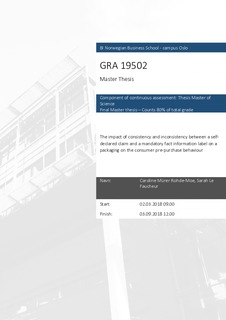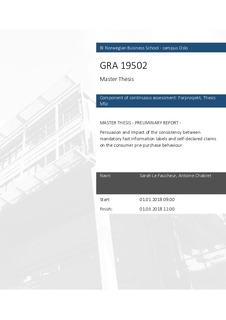| dc.description.abstract | Our Master thesis tests the impact of consistency and inconsistency between
a self-declared claim1 and a mandatory fact information label2 on a same product
packaging on the consumer pre-purchase behaviour in terms of attitude, purchase
intention and memory. The empirical testing introduces a controlled experimental
approach regarding the level of sensitivity and knowledge of the consumer about
nutritional and environmental issues and labels. After having collected 180 answers
from an online survey, results show that consistency between a self-declared claim
and a mandatory fact information label leads to more favourable attitude and higher
purchase intention towards the product than inconsistency. However, to contrast
with attitude and purchase intention, memory is rather enhanced by inconsistency
that is likely to lead to a longer and deeper information process among consumers.
More specifically, some moderators like sensitivity and knowledge are found to
enhance the impact of consistency and inconsistency. Indeed, the relationship
between a sel-declared claim and a mandatory fact information label does not have
the same impact whether consumers are highly sensitive or highly knowledgeable
about environmental and nutritional issues and labels. Consequently, while
consistent placements appear natural, inconsistent ones adversely affect brand
attitude and purchase intention because they seem out of place and are discounted,
but promotes brand recall and recognition, forcing consumers to spend more time
on looking at the packaging elements, and in particular the brand name. However,
the results of the change in the different variables of the consumer pre-purchase
behaviour between highly sensitive/knowledgeable and the low
sensitive/knowledgeable. At the end, it is helpful to understand how consumers process different
sources of information on a same product packaging. In the light of the willingness
to inform consumers about their own consumption, this study shows that it is
necessary to sensitize and educate consumers to render all governmental projects
effective because it moderates the level of amount of information processed.
Beyond the need of clarity and education, brands and companies really must pay
attention to their communication strategy. Consumers are really receptive to
displayed information on package and can shift their attitude and purchase intention
regarding what they find on the packaging, particularly if the self-declared claim
and the mandatory fact information label are consistent or not. | nb_NO |

